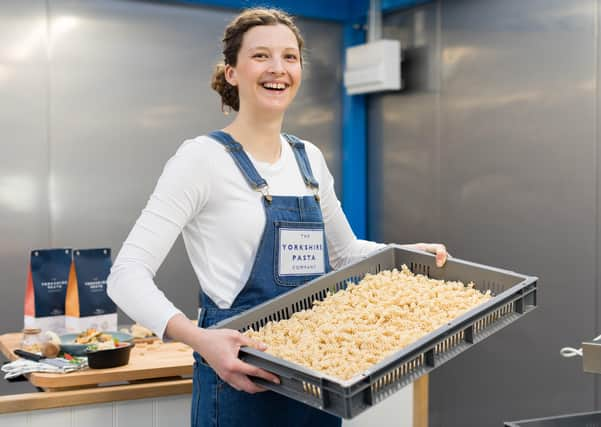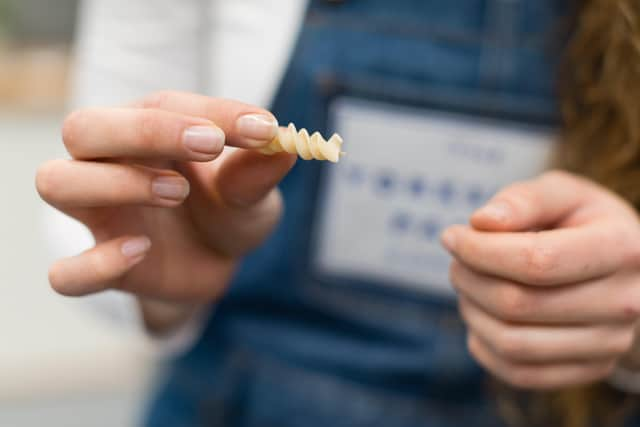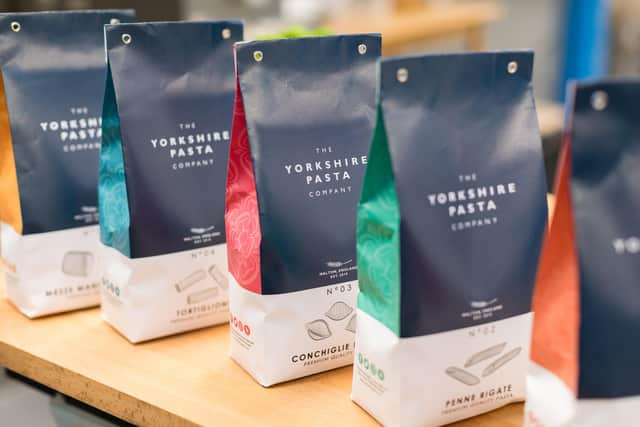Meet the woman making Yorkshire’s first ever pasta


It was while walking in the Lake District that Kathryn and Thomas Bumby hit on the idea of Yorkshire pasta. “We had wanted to launch our own business for sometime and had been thinking of what we could do,” says farmer’s daughter Kathryn. “I have always been a foodie and was working for Nestlé making wafers and so we wanted to do something food related. But it was while walking up Cat Bells in the Lake District that we came up with the idea of Yorkshire Pasta.
“We thought at first the altitude had got to us but it just stayed with us.” You might think that the Italians have the pasta market pretty well sewn up, and you wouldn’t be wrong, but this determined couple decided to give it a go.
Advertisement
Hide AdAdvertisement
Hide AdThey started researching to see if there was anyone making pasta in the UK and were surprised to find there were very few and none in Yorkshire. “It was clear from the beginning that we had to do something different. We knew we wanted to create a premium product,” addss Kathryn. “We visited lots of farm shops and delis and we saw there was a gap for a premium British pasta.”


The only problem was that they had no idea how to make pasta.
But, having worked in the food industry for a number of years, Kathryn was no stranger to product development.
Like many good food businesses it all started in their kitchen at home with a rolling pin, flour and water. It soon became clear, however, why there aren’t more British manufacturers of pasta. “Most pasta is made from semolina using durum wheat that isn’t grown in this country – it’s something to do with the British climate,” says Kathryn.
Advertisement
Hide AdAdvertisement
Hide Ad“We were determined that our product would be as locally sourced as possible and so that ruled out importing the durum wheat.”


That caused a big headache for this young couple. So they set about trying other wheat, and Kathryn used her science and nutritional knowledge of protein, gluten and starch until she came up with a suitable alternative to durum wheat semolina.
“It took us six months and a lot of work,” says Kathryn, who remains tight-lipped about the final process. “We had to get it right as we knew the product had to be good – people wouldn’t just buy it because it was from Yorkshire. I then visited farm shops and delis and asked if it would be something they’d be interested in stocking. I didn’t even know if we would be able to make it at that point.
“At the same time I asked them about packaging. It was 2019 and plastic was at the front of everyone’s minds. I asked if they would consider stocking something that was made out of recyclable plastic – 80 per cent said no. So we knew that we had to find an alternative.”
Advertisement
Hide AdAdvertisement
Hide AdOne of the main problems of using paper packaging is that people like to be able to make out the shape of the pasta inside. Also, most paper bags for food are coated in plastic which defeated the purpose of what the Bumbys were trying to achieve.
Eventually they found someone that would make the bag they needed and came up with the idea of having illustrations of the pasta on the front. Kathryn and Thomas also managed to devise a way of closing it using eyelets normally used in making shoes.
But once they had their pasta dough and the packaging in hand, they hit another hurdle – how to dry the pasta to produce a consistent product without the Italian sunshine. “You have to be very careful drying pasta. If there is any moisture left in the middle then the pasta will crack,” says Kathryn.
At the time they were making their pasta in their converted garage, and the North Yorkshire climate was not conducive to consistent drying. “It was then we did actually go and seek help from the Italians,” she says.
Advertisement
Hide AdAdvertisement
Hide AdThe couple bought a machine which ensures the pasta is dried consistently and decided to rent a unit in Malton. It may not be Tuscany, but it is the food capital of Yorkshire and as such seems a pretty good place to launch a pasta business. “We wanted a purpose-built unit and, although it isn’t huge, it works for us,” adds Kathryn.
She has now given up her job at Nestlé to work full-time at the Yorkshire Pasta Company, which launched a few months ago. “When coronavirus hit and then lockdown there was a shortage of pasta and people did ask if we would bring our launch forward,” says Kathyrn.
“But having worked in food production for a number of years I know it is important not to change your plans, as the product needs to be made safely. We took a risk and stayed with our original date.”
The response, she says, has been incredible. “We managed to attend the Find Food Show North just before lockdown and that really helped. We now have stockists in Yorkshire and even as far afield as Edinburgh and Essex.”
Advertisement
Hide AdAdvertisement
Hide AdThe Yorkshire Pasta Company has five different kinds of pasta and Kathryn has come up with recipe ideas that are on the website. “We took a risk and followed our dream and it seems to be paying off,” she said.
www.yorkshirepasta.co.uk
Comment Guidelines
National World encourages reader discussion on our stories. User feedback, insights and back-and-forth exchanges add a rich layer of context to reporting. Please review our Community Guidelines before commenting.